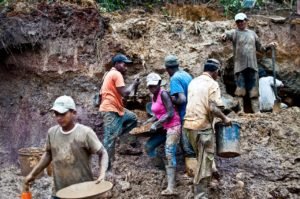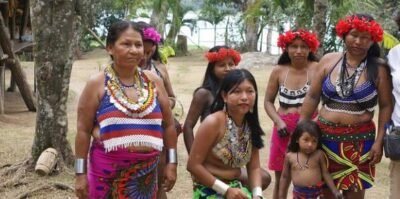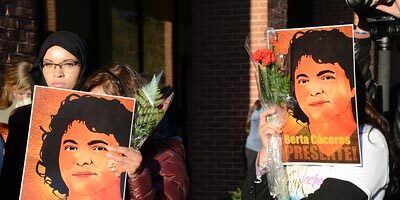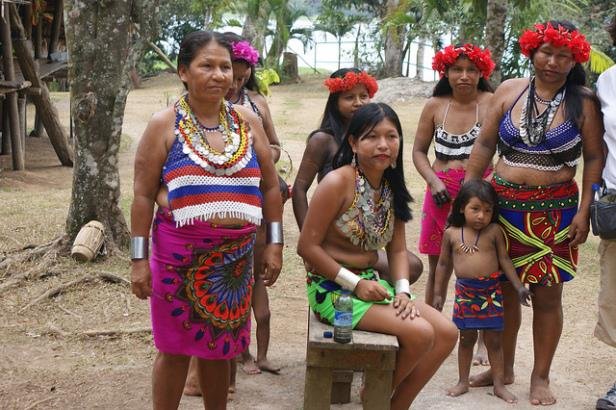Illegal armed groups and foreign companies are responsible for the assassinations of human rights defenders in Colombia to fuel their own profit, says Francisco Ramirez Cuellar, a Colombian human rights and labour lawyer and a trade union activist.
Mr. Cuellar has represented families of victims of multinational companies operating in Colombia for many years. In 1988 he started his activism as trade unionist during which he was appointed as President of the Colombian Coal Miners Union and as Vice President of the Federation of Government Workers. Very outspoken in his criticism of companies operating in Colombia, in his career as unionist he was a leader in for four strikes in the mining and energy sector. He has also been quite active in inciting international social movements boycotting mining companies for their human rights violations, which has resulted in eight attacks on his life.
According to him, Colombia has witnessed 416 murders of human rights activists only in the last two years. In Canada to publicize the situation, in an interview for this article he claimed that these killings are partly committed by foreign oil and mining companies that come to Colombia to do business.
Juan Vargas is professor of economics at the Universidad del Rosario and an expert in guerilla group violence against social leaders. Interviewed for this article, he said that the killings committed by guerilla groups are part of a fight for control in areas formerly controlled by the FARC, a guerilla group that demobilized after the Peace Agreement with the government in 2016.
According to both Mr. Vargas and Mr. Cuellar, both the armed groups and the companies have a common goal – to generate as much profit as possible, while completely disregarding other concerns. The companies’ activities cause environmental damage and the displacement of local communities. This provoked several social community leaders to stand up against them, for which they paid with their lives.
The Aftermath of the Peace Agreement
In the two years after the signing, the Peace Agreement with the FARC led to a remarkable decline of 40% in the overall murder rate according to an article in Reuters. However, according to Mr. Vargas, there has been a significant rise in murders of human rights activists already before that.
[boxright] In the past two years, Colombia has witnessed a significant rise in assassinations of local human rights activists. Since 2016 over 400 activists have been murdered due to their engagements in social and environmental issues, which posed an obstacle to different interest groups.This rapid rise in murders started about one year before the signing of the Peace Agreement in November 2016 between the government and the FARC (The Revolutionary Armed Forces of Colombia), the largest guerilla group in Colombia. Warfare between the FARC and the government ceased, the FARC demobilized and became an official political party with guaranteed seats in Congress, its members recognized as citizens.[/boxright]
In December 2014, the FARC declared a permanent ceasefire, which opened the field for those guerilla groups that were excluded from the peace negotiations to occupy the areas formerly controlled by the FARC. Those include the ELN guerilla group, FARC-dissidents and criminal bands formed by former paramilitary fighters. As a result, the FARC has left a power vacuum that led to battles between other armed groups that were attempting to fill it.
“One strategy that is very common to establish control in those areas is to target civilians, mostly social leaders, to prevent the collective action to take place at the local level,” Vargas said. “This mitigates the capacity of communities to be vocal by killing their leaders.”
According to the end of mission statement by the UN Special Rapporteur Michel Forst on the situation of human rights defenders on his visit to Colombia in 2018, this situation is a consequence of the extremely slow and inefficient implementation of the Peace Agreement in the areas worst affected by the armed conflict that are beyond state control. This gives way to armed organizations overtaking these territories, predominantly in the rural areas of Antioquia, Cauca, Chocó and Nariño. This includes murdering activists that pose an obstacle to their interests, especially those working on human rights and land rights, and leaders from Afro-Colombian and indigenous groups. Their communities are particularly threatened and very often forcibly displaced.
According to Mr. Vargas, the killing of social leaders has been happening since before 2009, but there was a big upwards trend in these murders since January, 2015. “The communities that are targeted the most are the Juntas de Accion Comunal,” he said. “These are a bond of communities that hold land restitution rights”.
These communities are a crucial link to the government for the implementation of the Peace Agreement in remote rural municipalities because they establish dialogues with the people living in those areas and cater for their needs. But they also suffer a high rate of land dispossession among farmers. Municipalities that benefit from land restitution rights show the highest murder rates of social leaders because the government has failed to consolidate state control there. According to Mr. Vargas, there is a lower murder rate of social leaders in municipalities that have a better judicial system in place than in those without, which directly reflects the extent of the state control.
Criminalization of human rights defenders by multinational companies
According to the Global Forest Coalition, the government has been largely silent and inactive regarding the attacks against activists. Many go unreported and even if victims file complaints, they often get turned down because they require proof of the attack. A report by the International Federation for Human Rights says that in certain cases activism has even become a criminal offence.

Oil and mining companies often have an interest in carrying out their business that consequently clash with local communities. Many of these companies are based in the UK and USA, but also include Canadian companies like Pacific Exploration & Production Corp. and Ecopetrol. By denouncing community opposition as impeding the economy, these companies threaten the activists’ lives.
“Colombia is a state that is completely controlled by multinational companies, and their lawyers establish laws that benefit them,” Mr. Cuellar said. “They cause lots of misery, violence and the displacement of entire communities. I was in a case where the coal company Drummond filed a lawsuit against me personally in the USA and in Colombia saying that I didn’t have the right to speak against them. However, the judge in Colombia decided in my favour stating that I’m a lawyer and that I have the right to say whatever I want. So, this was a win for us.”
He considers the government to be corrupted. “The whole state apparatus works in favour of the companies. In 2001, the government and multinational companies in Canada participated in establishing three Colombian laws regarding the oil, mining and environmental sector that gave them numerous benefits including massive tax reductions. It sounds absurd, but it basically means that Canadian companies have to pay one dollar to do business there and Colombia has to pay eleven dollars to them.”
According to the report by the International Federation for Human Rights, the violence against social leaders has significantly exacerbated since the signing of free trade agreements with the European Union and the USA in 2012. This led to a 50% increase in the country’s exports between 2013 and 2016 but the flourishing export economy has led to a profit-at-all-costs-mentality. As a result, human rights defenders are regarded as obstacles that slow down the economy. Companies such as Chiquita would even pay paramilitary groups to guard their production facilities against activists, says Mr. Cuellar. According to him, the murders committed by companies happen predominantly on mining and oil sites spread all around the country, with the majority being committed in the border zone of Venezuela because it serves as a gateway to Venezuela’s oil sites.
Mr. Cuellar then told me about a deceitful but common method that companies apply to occupy mining sites in Colombia. He gave me the example of the gold company Anglo Gold Ashanti based in the UK and South Africa and their exploitation of Chocó, a region bordering the Pacific and partly owned by the company, which is now heavily scarred by deforestation. This company signed a security contract with the Colombian army that gives paramilitaries and guerilla groups the right to exploit this region first. The reason for that is because Chocó is an area that was very densely covered by forest. In order to do mining, a clean area without trees is needed that allows the digging of holes in the ground. This primary work is undertaken by illegal groups. After the hard work is done, the area is ready for the company for instalment. The destruction caused by illegal groups is then being used by the company as a pretext to present themselves as a kind of saviour that brings development and harmony to the region, thus, boosting their public image.
“The government is massively corrupted by these companies,” says Mr. Cuellar. “In a moment of sincerity a lawyer of a multinational company told me that they are basically here to corrupt the government.”
Not as bad as it seems?
However, in an interview with Maria Margarita Zuleta, a lawyer and professor at the Universidad de los Andes in Colombia who specializes in corruption, she says: “The judicial system in Colombia has many problems. But the criminalization of activists is not the norm here, even though there have been cases. I really don’t believe there is an issue with companies in Colombia”.
Since 1991 there has been a legal device in place called Accion de tutela that serves to protect Colombians’ fundamental rights and allows individuals to file complaints without consulting a lawyer, a system that according to Ms. Zuleta is quite successful. “You can stop mining operations, fracking, and even the election of a politician with it.”
However, she confirmed that there have been cases such as the one of the U.S. coal company Drummond that in 2001 was accused of helping the paramilitary group Autodefensas Unidas de Colombia kill social leaders. The lawsuit against the company was unsuccessful as the judge decided in its favour.
“At the end of the day, it looked like paramilitaries committed those murders but there is no evidence of a link between them and Drummond,” says Ms. Zuleta. “But this case opened up a discussion because allegations were in place. Of course, there are all these illegal mining actors threatening everybody. But those are not legitimate companies.”
Milena Calcagni
“A Swiss national, I am a graduate in European Studies and English Literature at the University of Fribourg in Switzerland. I also obtained my bachelor’s degree in English Literature from the same institution. I have a keen interest in matters of human rights issues and how to solve them. This led me to my decision to undertake an internship at SJC where I write articles for the Upstream Journal.”





